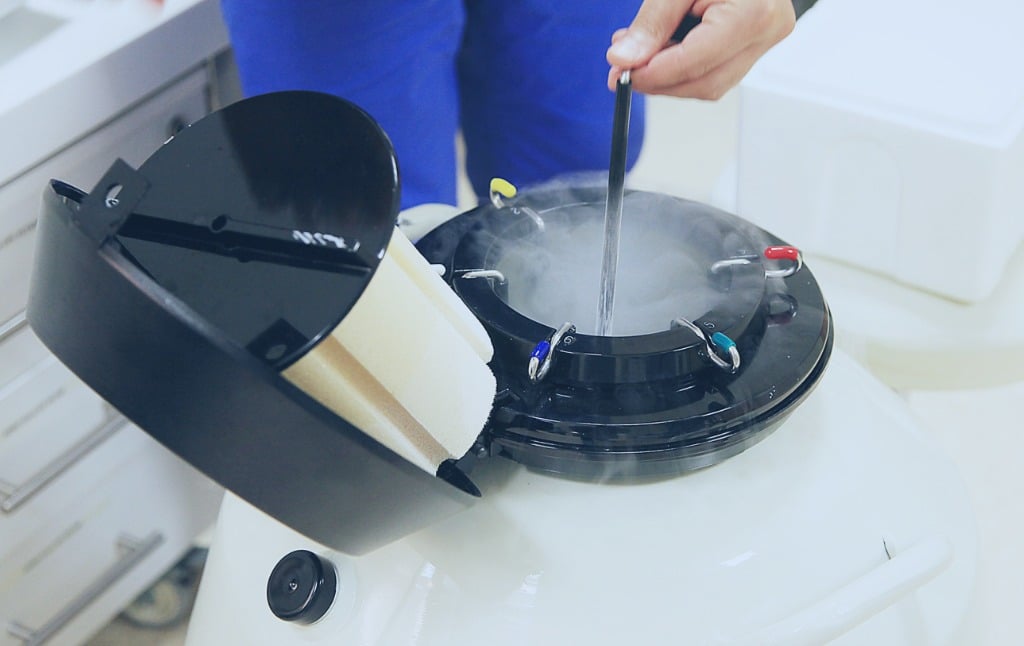It might not seem like much of an elder law question at first glance. But among the legal issues posed by advances in technology are those related to heirship, parentage — and ownership of in vitro fertilization (IVF) products. The law has been slow to catch up.
Mr. and Mrs. Rich get divorced
Melissa and David Rich (we’ve changed their names, just so this article doesn’t appear every time someone searches for their names) were married in 2002. Both wanted children, but they had difficulty getting pregnant. Eventually they turned to IVF.
In 2011, and again in 2013, Melissa and David signed up with an IVF center in Colorado. Each time the center created several embryos (technically, they are pre-embryos until implanted) and implanted a few others. Melissa and David had three children using the IVF procedures.
In each of the IVF procedures, there were several embryos not implanted. They were stored in liquid nitrogen; that way, the couple would be able to try again, if necessary, without having to go through the entire process. There were six remaining embryos after the two procedures.
The IVF center had Melissa and David sign agreements about what would happen to the remaining embryos if, for example, either of them were to die. The agreement did not specify what would happen if the couple divorced, saying only that they would have to work it out in that event.
In 2014, Melissa and David separated. They divorced the next year, but could not agree about the six embryos. The divorce court ultimately ordered that David should make the final decision about the embryos.
The Court of Appeals decision
Melissa appealed. She argued that the trial judge had misread the IVF contract, and that her interest in having children should have outweighed David’s interest in not becoming a parent. Most significantly, perhaps, she insisted that the trial judge’s consideration of David’s interest violated her own Constitutional rights.
In the trial proceeding, the judge had determined that Melissa might want to have more children, and that she might want to use the embryos. If she did, the judge reasoned, she could not (under Colorado law, at least) insist on David paying child support. But her larger family could, in theory, increase the calculation for child support David would have to pay for his other children.
Melissa reasoned that the court’s argument violated her Constitutional rights to equal protection, due process, procreational autonomy, and privacy. It also violated her liberty interest in the care, custody and management of her children, she argued.
The Colorado Court of Appeals affirmed the trial judge’s decision giving David control of the embryos. The appellate judges thought that the trial judge had done a good job of balancing the competing interests of David and Melissa in coming to its conclusion.
The Colorado Supreme Court reverses
In a 4-3 split decision, the Colorado Supreme Court overturned the Court of Appeals decision last week. The slim majority held that the trial judge should have considered — and balanced — Melissa’s interest in procreation and David’s competing interest in not
The Supreme Court majority noted that, on remand, the trial judge should not consider whether either party could afford to become a parent, whether they already had “enough” children, or whether they could adopt instead. The ability of either of them to become a biological parent by more ordinary means would
Three justices disagreed. They argued that the question should be whether there is mutual agreement to implant the embryos. If not, the dissenting justices insisted, neither parent should be allowed to proceed. That argument did not prevail. Marriage of Rooks,
What about Arizona?
It’s very hard to predict how Arizona courts might rule in similar facts. Like Colorado, Arizona has adopted the Uniform Probate Code (which touches on some of the parentage considerations). Neither state has adopted the current version of the Uniform Parentage Act, which might address at least some of the issues. Colorado had adopted an earlier version of the Uniform Parentage Act, and the Colorado Supreme Court cites to that law; Arizona had not adopted even the earlier version.
Other states have done a better job of keeping up with changes in the technology. The Uniform Probate Code, for instance, was extensively updated in 2008. Though Arizona was one of the first states to adopt the original Uniform Probate Code (back in 1973), we have not yet done anything to enact the 2008 updates. Colorado is one of the five states (plus the U.S. Virgin Islands) to have completed the 2008 updating. Meanwhile, Arizona has dealt with the related questions that might arise after birth of a child in a same-sex marriage.
Irony
While Melissa and David’s case was working its way through the Colorado court system, Melissa maintained that she would want to keep the embryos in case she might need them to become pregnant again. After the Court of Appeals decision, but before argument in the state Supreme Court, she apparently became pregnant by more conventional methods. The court reports that she gave birth sometime before the opinion was issued. She still wants to receive the embryos so that she might use them in the future.



